With winter here and the holiday season upon us, it is important to increase your chances of staying healthy during the festivities associated with this time of year.
Fortunately, our I-MASK+ protocol includes lots of wonderful ways to boost your immune system and avoid illness during this time of year in particular. So we put together a Healthy Holiday “Gift Guide” — think of it as a holiday shopping list for good health!
Stock up on these simple, over-the-counter items to help keep you #COVIDstrong all year long.
Vitamin D
Vitamin D is essential for optimal health. Only a few foods contain Vitamin D, and the other most common natural source of Vitamin D is sun exposure. That’s why we need to be extra mindful of getting enough of it in winter.
Our protocol recommends 1000–3000 IU per day of Vitamin D3 (25-75 mcg).
Studies have shown an association between Vitamin D insufficiency and an increased risk of acquiring COVID-19 and from dying from the disease. Vitamin D supplementation may, therefore, be an effective and cheap way to lessen the impact of the disease. Particularly vulnerable populations include the obese, the elderly, and people of color.
A recent study showed a relationship between Vitamin D status and the severity of COVID-19 in pregnant women. During the pandemic period, therefore, Vitamin D supplementation for pregnant women should gain more importance.
Helpful Resources
— Vitamin D insufficiency is prevalent in severe COVID-19
— The Possible Role of Vitamin D in Suppressing Cytokine Storm and Associated Mortality in COVID-19 Patients
— Evidence that Vitamin D Supplementation Could Reduce Risk of Influenza and COVID-19 Infections and Deaths
Melatonin
Melatonin is a natural hormone best known as a sleep aid, as it helps adjust the body’s internal clock or “circadian rhythm.” Since getting good sleep is an important part of staying healthy, that alone is an argument for a daily dose of melatonin. But researchers have recently found a link between melatonin and COVID-19 prevention, as it has antioxidant and anti-inflammatory effects.
It is intriguing to note that bats, the natural reservoir of coronavirus, have exceptionally high levels of melatonin. Scientists believe this may be what protects bats from developing symptomatic disease.
Our doctors recommend starting with a low dose and gradually increasing it as your body adjusts. An ideal dose is around 6 to 10 mg per night, taken before bedtime as it does cause drowsiness. A slow release formula is preferable, as it more closely resembles the body’s natural circadian rhythm.
Helpful Resources
— Can melatonin reduce the severity of COVID-19 pandemic
— The Effect of Melatonin on Thrombosis, Sepsis and Mortality Rate in COVID-19 Patients
Mouthwash
“Gargle twice daily.” Maybe not the three words you were hoping to hear, but did you know that gargling with the right kind of mouthwash can help stave off COVID-19 or reduce viral load if you get sick?
Let’s talk about the “right kind of mouthwash.” Check the label for words like “antiseptic” and/or “antimicrobial.” Ingredients may include: chlorhexidine, povidone-iodine, cetylpyridinium chloride and a combination of eucalyptus, menthol and thymol.
Mouthwashes with these ingredients are not just good at keeping your teeth clean and breath fresh, but they also have the ability to kill or inhibit the growth of microorganisms.
A study in Bangladesh found that COVID-19 patients with symptomatic disease treated at home with a 1% povidone iodine mouthwash/gargle, along with nasal and eye drops, resulted in a dramatic reduction in morbidity, hospitalization and death.
The doctors at FLCCC recommend gargling with these kinds of products twice a day.
Helpful Resources
— Use of mouthwashes against COVID-19 in dentistry
— Virucidal Efficacy of Different Oral Rinses Against Severe Acute Respiratory Syndrome Coronavirus 2
Zinc
Zinc is an essential nutrient found in foods such as red meat, fish and poultry. Humans need zinc for our health and growth — it helps with immune function, healing wounds, blood clotting and thyroid function.
The I-MASK+ protocol recommends 30-40 mg of elemental zinc per day. Commercial supplements contain anywhere from 7 to 80 mg of elemental zinc, and are commonly formulated as zinc oxide or salts with acetate, gluconate, and sulfate. As a reference, 220 mg of zinc sulfate contains 50 mg of elemental zinc.
Prolonged high doses of zinc (over 50 mg per day) should be avoided, as this is associated with copper deficiency.
Helpful resources
A combination of high-dose vitamin C plus zinc for the common cold
Quercetin
Quercetin, at a dose of 250 mg daily, can have potent antioxidant and anti-inflammatory properties. It is a type of flavonoid, which are plant pigments that give many fruits, flowers and vegetables their color. Quercetin is found in foods like red wine, onions, green tea, apples, and berries.
A few things to note: due to a possible drug interaction between quercetin and ivermectin these drugs should be staggered (take one in the morning and one at night). Patients taking cyclosporin or tacrolimus should avoid quercetin. And for anyone with pre-existing thyroid disease or thyroidism, the lowest dose of quercetin should be used when taken as a preventative.
Helpful resources
Synergistic Effect of Quercetin and Vitamin C Against COVID-19
Don’t forget! Check back here often for updates to this post as more over-the-counter items are introduced to keep you and those you love #COVIDStrong through the holidays and beyond! Stay well!
Vitamin C
Vitamin C is a key component of the I-MASK+ protocol, and an important part of staying healthy in winter. Vitamin C has important anti-inflammatory, antioxidant, and immune-enhancing properties. It’s likely that Vitamin C and quercetin have synergistic benefits. Same goes for zinc, too.
Lots of fruits and vegetables have Vitamin C, and you should definitely eat as many of these as you can. But to get the maximum benefit, a daily supplement is likely needed. The protocol suggests taking 500 – 1000 mg two times a day. Don’t worry, you can’t technically take too much – your body will flush out excess Vitamin C, and you’ll know when that happens! Just back off until that goes away and you’ll be comfortably maxed out and protected with all that Vitamin C can provide.
Helpful resources
A combination of high-dose vitamin C plus zinc for the common cold
Synergistic Effect of Quercetin and Vitamin C Against COVID-19
Curcumin
Curcumin (turmeric) is a common ingredient in Eastern medicine and cuisine. And while it’s put to broad use in all manner of cooking from the region, when taken as a prophylaxis it has been shown to be an effective antiviral, anti-inflammatory and antioxidant. The emerging data backs this up; curcumin improves the clinical outcome of patients with COVID-19.
The dose for early treatment is simple: 500mg twice a day (or written another way, 1000mg a day). The approximate equivalent of 500mg is 1/6 teaspoon or else 1000mg is a 1⁄3 teaspoon.
There are many ways to ingest curcumin, though optimum uptake by the body is achieved in combination with black pepper and fats such as milk, yogurt, kefir, etc. Check out your local Indian grocer (if you’re lucky enough to have one near you) as some carry the fresh turmeric root, which can be easily made into a tisane (herbal tea). You can also find curcumin supplements in health food stores, which you can easily take with meals.
Helpful resources
The incomparable Dr.Been on turmeric
Everything you wanted to know about curcumin
Nigella Sativa
Nigella sativa is sometimes called black cumin seed. Though the names are used interchangeably, what’s most critical is that this plant has immunoregulatory, anti-inflammatory, and antioxidant properties.
One of the promising outcomes of prophylactic use of Nigella sativa is prevention of inflammation and lung injury, thanks to an active chemical compound it contains (for the scientifically bent, search out Thymoquinone). In addition to protecting the lungs, this compound also has positive interactions with kidney and liver function, and the heart (positively influencing blood pressure and reducing cholesterol). It even helps with digestion and regulation of blood sugar, and may dull seasonal allergies.
If you’re in the health food aisle, look for Nigella sativa in various forms including supplements, seeds or as pure oil. As a preventive treatment, add 40 mg per kilogram of body mass per day to your daily vitamin regimen. If you suspect COVID-19, double the dose for early treatment – 80 mg/kg per day – until resolution.
Helpful resources
Side effects and contraindications
Honey and Nigella sativa with Dr. Been
Honey
Honey is one of the oldest natural therapeutics known to man and its list of benefits is long and comprehensive.
Honey enhances antiviral activity, boosts immunity, and is an antioxidant. It helps with a host of illnesses including diabetes, cardiovascular disease, and problems with respiration and the gastro-intestinal system. It has comprehensive anti-inflammatory properties including inhibiting the production of pro-inflammatory cytokines – something COVID-19 is notorious for creating. However, even in the presence of cytokines, honey helps to regulate their production.
Garlic, cinnamon, and ginger enhance honey’s efficacy (honey-garlic wings, anyone?). Our protocol recommends 1 gram per kilogram of body mass per day as a preventive treatment dosage.
Helpful resources

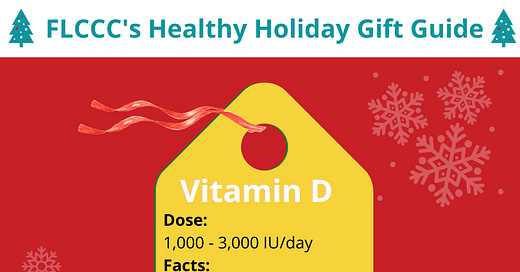




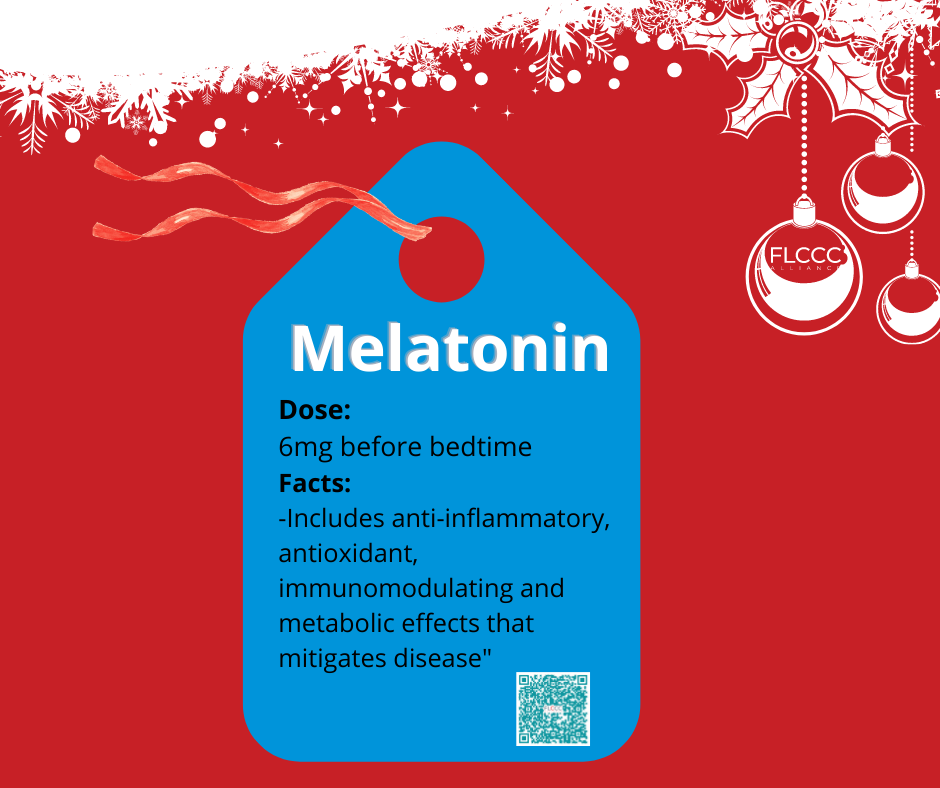



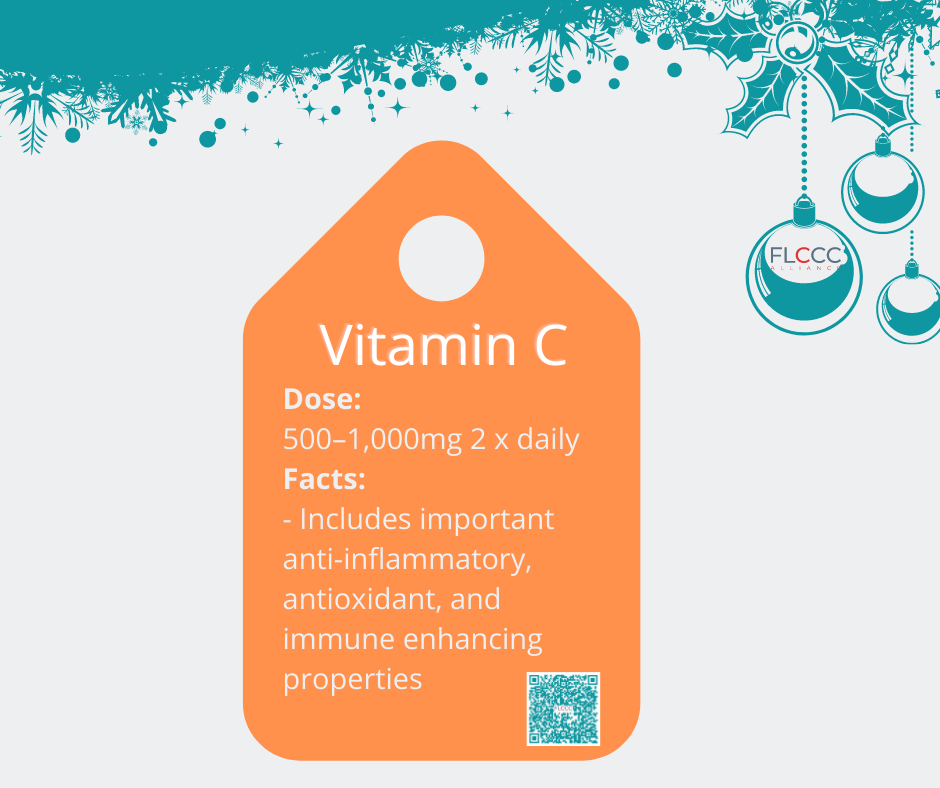
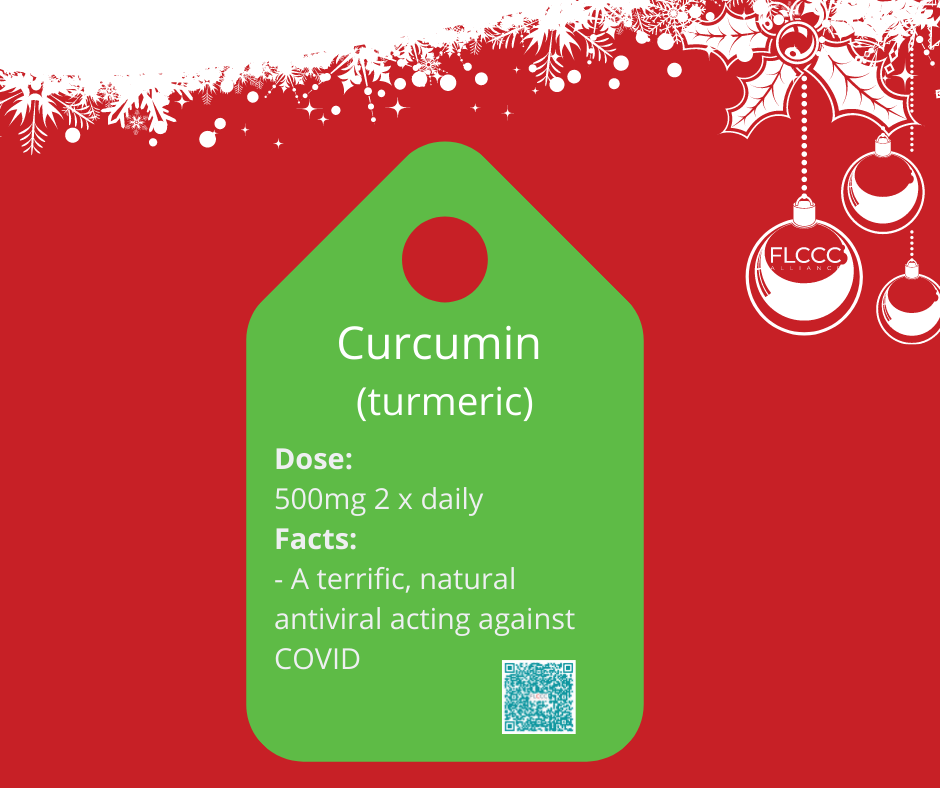

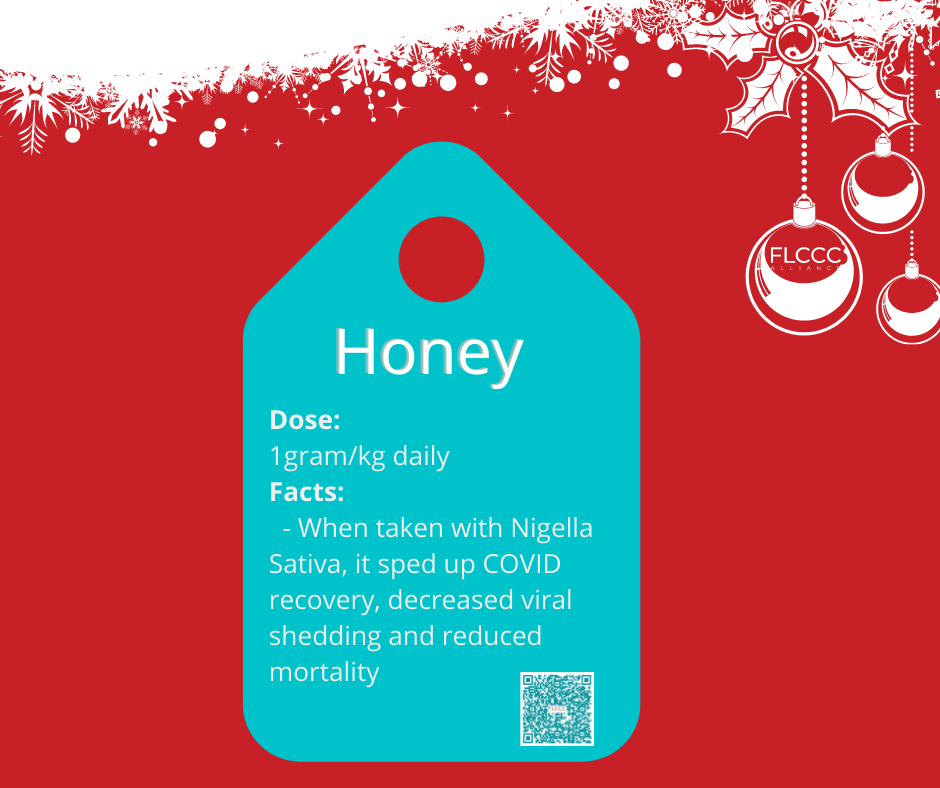
We currently do not have advised doses for children but we will be working with a pediatrician in the near future and hope to have them soon!
Thank you all for the comments and questions! Our FLCCC doctors cannot provide individual clinic support, we are a small non-profit, but our Alliance network is growing. Check out our directory: https://covid19criticalcare.com/ivermectin-in-covid-19/how-to-get-ivermectin/